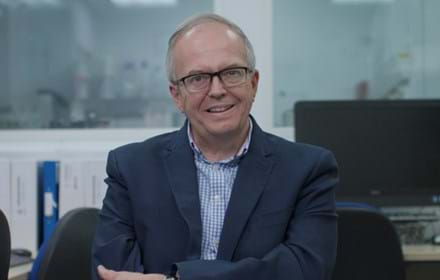
Stem cell-derived, fully differentiated islet cells for type 1 diabetes
Breakthroughs on the replacement of pancreatic beta-cells discussed at the recent European Association for the Study of Diabetes conference in Stockholm.
DRWF has been significant funder of islet cell research and transplantation in the UK and around the world since 2004, when the charity made an unprecedented £1.2 million award to the Nuffield Department of Surgery for the provision of a the Human Islet Isolation Facility at the Churchill Hospital, Oxford.
This centre is pivotal to the national Islet Transplant Programme, supplying islets for research and clinical transplant.
In collaboration with sister organisations, DRWF Inc (USA) and Diabetes Wellness Sverige (Sweden), DRWF has made beta cell replacement a strategic priority in its research strategy, in search of a cure.
At the recent European Association for the Study of Diabetes (EASD) meeting in Stockholm, during the lecture session dedicated to breakthroughs on the replacement of pancreatic beta-cells, Camillo Ricordi, Director of the Diabetes Research Institute, Miami, and colleagues presented promising preliminary data from an investigational allogeneic stem cell-derived pancreatic islet cell replacement therapy, termed VX-880.
Recent studies have shown that transplantation of pancreatic islets from deceased donors can result in successful control of blood sugar levels in recipients with type 1 diabetes.
However, islet isolation and purification from the pancreas involves a process, which causes physical trauma to the islets, affecting both the quantity and quality.
Consequently, there has been much effort by researchers in identifying alternatives.
One such alternative is VX-880, an islet cell therapy in clinical development for type 1 diabetes complicated by severe hypoglycaemia (low blood sugar levels). This islet cell therapy is administered via a cell infusion protocol and immunosuppression regimen that have been developed from the conventional islet cell transplantation.

The primary objective of this study which is taking place in the US and Canada is to evaluate the safety, tolerability, and efficacy of VX-880 infusion in patients with type 1 diabetes and impaired hypoglycaemia awareness and severe hypoglycaemia.
The results presented were from the initial part of the ongoing study.
The therapy was infused under experimental conditions to two patients. Patient 1 was a 64-year-old male with a 42-year history of type 1 diabetes, along with impaired awareness of hypoglycaemia, undetectable levels of fasting and stimulated C-peptide and an HbA1c of 8.6%.
Patient 1 had had five severe hypoglycaemic events (SHEs) prior to receiving VX-880 and was on 34 units of insulin per day at baseline.
Patient 2 was a 35-year-old female, living with type 1 diabetes for 10 years, undetectable levels of C-peptide and an HbA1c of 7.5%.
Both patients received a single infusion of VX-880 at half the target dose.
The safety and tolerability were assessed by several clinical and laboratory parameters, including adverse events (AEs), measurements of fasting and stimulated C-peptide levels, HbA1c, variability in glycaemia, and amounts of insulin requirements before and after treatment.
After just a single infusion of VX-880 in patient 1 the team were able to measure detectable amounts of fasting C-peptide by Day 29, which increased rapidly thereafter. There was a corresponding decrease in HbA1c and daily insulin requirements.
The authors further report that at Day 270, Patient 1 remained insulin independent with a significantly improved glycaemic control and an HbA1c of 5.2%.
Similarly Patient 2 exhibited parameters which were consistently improved through to the final time point assessed in the study (up to Day 150), with an ameliorated HbA1c of 7.1% and a significant 30% reduction in her insulin requirement.
The researchers concluded that VX-880 was regarded as safe and well tolerated. The AEs which were observed were mild or moderate and associated with immunosuppression.
Importantly, following the treatment, neither patient had SHEs after Day 35.
These results represent proof-of-concept and the first set of evidence from a clinical setting demonstrating that islets derived from stem cells can restore insulin production and successfully achieve glucose control in type 1 diabetes, potentially paving the way for the successful treatment of the disease without the need for islet transplantation from cadaveric donors.
The study which continues to enrol patients is being led in collaboration between the University of Miami, University of Pennsylvania, Vertex Pharmaceuticals, Boston Children's Hospital, University of Southern California, University of Chicago and Massachusetts General Hospital.
Professor Paul Johnson, Director of the Oxford Islet Isolation and Islet Transplant Programmes, said: “This is a very exciting trial, and the Oxford team has been chosen as one of the European centres to take part in this next year.”
Professor Johnson will lead the UK contribution to this trial.
It is anticipated that subsequent work will seek to transplant cells in capsules without immunosuppression, which, if possible, would change the landscape for stem cells and islet transplantation worldwide, and suggests a significant step forward towards a practical cure.
Read more about the DRWF Human Islet Isolation Facility
Find out more about type 1 diabetes
Support DRWF by making a donation here
Find out more about DRWF-funded research here
Find out more about DRWF fundraising here
For latest update follow DRWF on Facebook, Instagram and Twitter
To receive the charity’s latest bulletins as they become available, please sign up here
Read DRWF diabetes information leaflets here
Join the Diabetes Wellness Network here
Recent News


